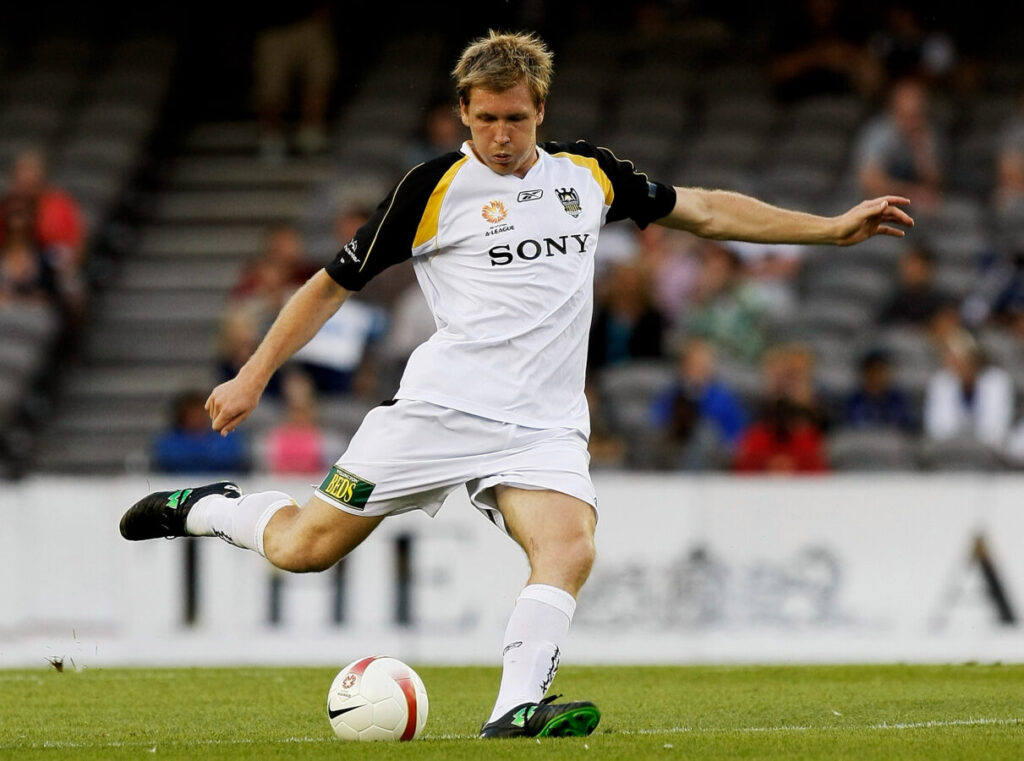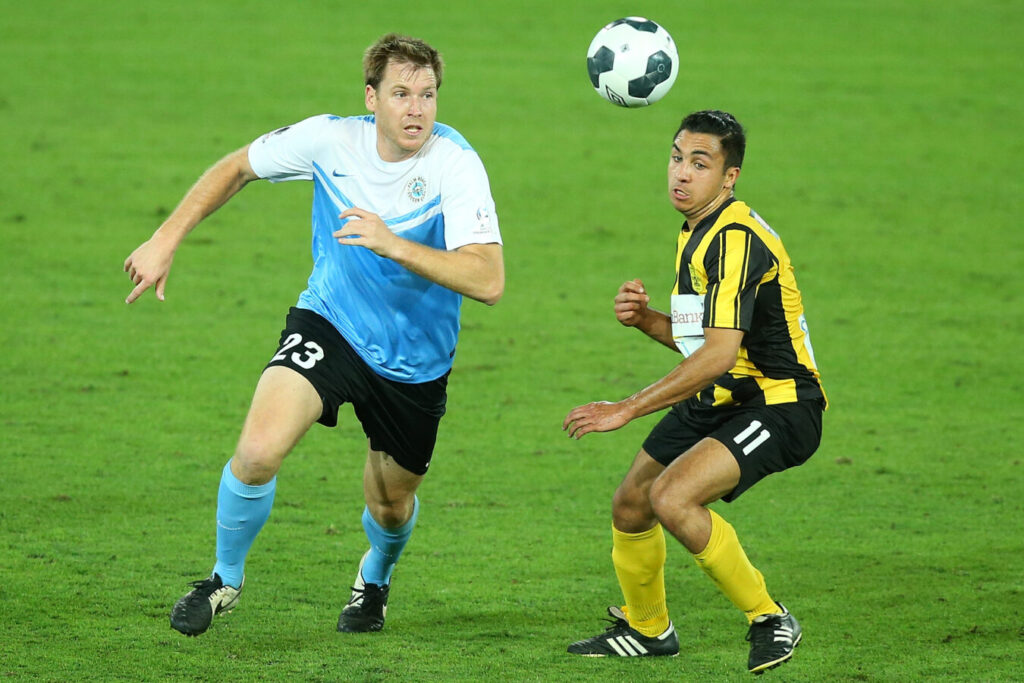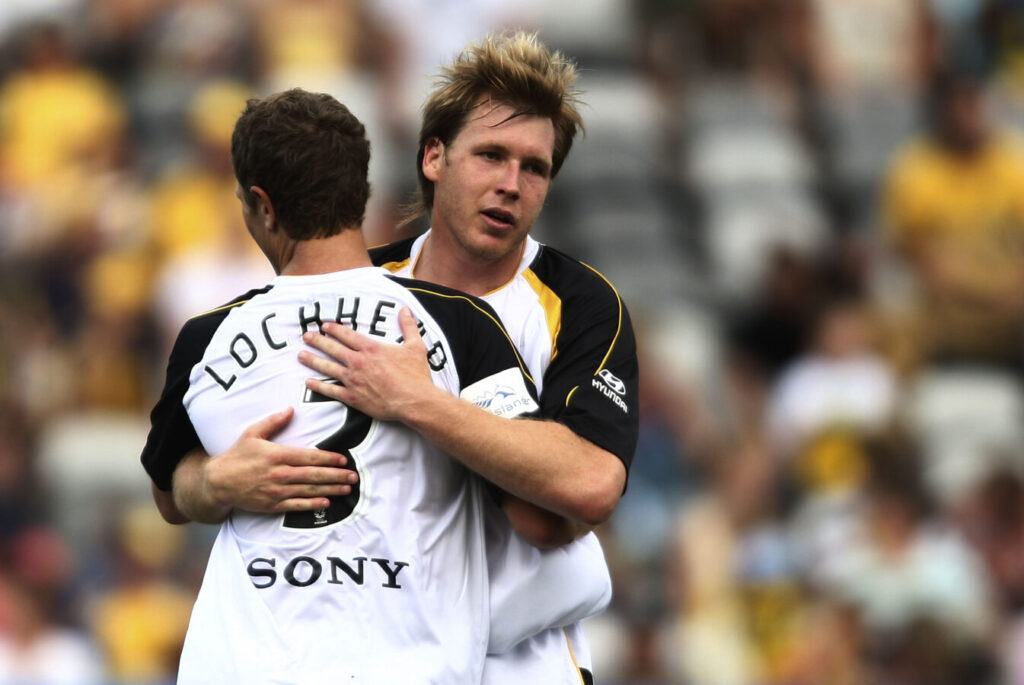
Karl Dodd’s footballing journey has traversed the NSL and A-League, Scotland and Hong Kong and has now taken him to Guam. Currently head coach of the Guam national team, Dodd continues to challenge himself and his players on the pitch, with his next ambition to tackle the Kokodo Trail. pfa.net.au caught up with Dodd to discuss his career to date and the fascinating journey that has landed him on a small Island in the Western Pacific Ocean…

How would you summarise your playing career as a whole?
I would describe myself as a player that worked extremely hard coming through the local ranks and state leagues to gain a rare opportunity in Queensland football’s only professional team, the Brisbane Strikers, back in the National Soccer League (NSL) days.
I continued to work hard to become a solid and reliable defender that saw me play in the NSL, A-League, Scottish Premier league, and Hong Kong, with small stints in the NPL when retiring. I spent a large part of my career overcoming knee injuries, with two knee reconstructions, numerous debridements, a micro fracture and a 16- month rehabilitation process for a procedure called a MACI graft where they try to regrow your cartilage from stem cells, but at the end of the 16-month rehabilitation the graft failed.
So I would say I overcome a lot of adversity in my playing career to continue to play at a professional level.
It has been a few years since you were in Australia playing football – how would you summarise the last 4-5 years as you transitioned out of playing into a career in coaching?
The transition from playing to coaching is daunting at times during those initial transition years, as much as you can prepare for it with education and career transition, the psychological aspects are extremely hard to overcome at times because you miss the days where you could just turn up and train and play for a living and you can no longer do that anymore and it becomes a different world.

You need to change your mindset and accept retirement, otherwise you become those ex-players or coaches who live in the past and everything is a reference to yourself as a player rather than focusing on the present and looking to create new opportunities and achievements.
You had various roles at A-League clubs, including strength and conditioning coaches at the Newcastle Jets and High Performance Manager at Brisbane Roar – what did those roles offer you when you were transitioning out of playing?
Due to my injuries throughout my career I had already entered into intermittent coaching stints while playing and was going through the coaching course processes and tertiary education.
Those courses (B and A Licences) were a real eye opener. The competition for coaching jobs at a professional level was extremely competitive and I needed to think about another way to work at the professional level that would assist in my long-term goal of being a head coach.
When you first start working with your peers – and in particular players you played with or against – it can become daunting and something that takes time to overcome, particularly learning to communicate properly with them. Having studied at university and undertaken the coaching courses and then reflecting on our current practices compared to what happens in Europe, I believe that we need to be doing more and be doing it better.

When I first started working at the Newcastle Jets, maybe I was a bit stubborn in my approach as I thought that all the knowledge I obtained, if put into practice properly, could result in the players being the best version of themselves.
But we are humans and are all different and I learned after reflecting on my time at the Jets that flexibility is required and building rapport with the person is key for that person to be the best player they can be. Having undertaken various roles at the professional and semi-professional level as a strength and conditioning coach, high performance manager, football director, and head coach, along with my tertiary education and coaching courses and the experiences I had at those clubs, I believe I am a lot more well-rounded and better off for it as a Head Coach.
I love the challenge that coaching presents every day and working with the players and staff to create the best working environment possible. I also love learning; I have a bad habit of buying books with every intention of reading but takes longer than expected to get them finished!
How did you manage to land the job as national team manager with Guam?
I had a message out of the blue from Belinda Wilson [former Brisbane Roar W-League Head Coach] and current Technical Director and Women’s National Team Coach of Guam. I had worked with Belinda previously at the Roar. She asked me if I would be interested in the Men’s national team job. After a lot of messaging back and forth about the job and Guam she told me to apply for the job. I threw my hat into the ring and it came down to four candidates. I happened to have a football trip with the Western Pride in Japan at the time of the interviews and I flew over for the interview and had a look around the island. I did well in the interview and after interviewing the other candidates I was offered the job.
What are some of the interesting, exciting and challenging aspects of your current role?
The interesting aspects of the role are the differences between international and club environments and the planning and communicating of the football aspects to players has to be perfect as you get limited time with these players compared to working day to day in club land, and you have to hit the ground running. The exciting aspects are working with the players, I really enjoy creating the operating environment and the planning of the training and seeing the improvements in the players and the way they want to know more so that makes it exciting looking forward to the next training session. The challenging aspects are to do with certain cultural aspects such as commitment and punctuality, which we have come a long way with in our time here by maintaining standards and showing them that it takes commitment and hard work to improve as a person and a player.

What is Guam like as a country – what do you like about the culture and the people there? Where are you currently living?
Guam is a beautiful island and part of the North Marianas, it is surrounded by a reef so the water is always crystal blue with nice beaches. It is a US territory so it is also very Americanized. It has an Air Force base at one end of the island and a Navy base at the other. It also has the largest mountain in the world – Mount Lam Lam (if you include the Marianas trench) which I can say I have hiked a fair bit. The CHamoru people are very laid back and friendly and are very family orientated. I am currently living in Tamuning in a two bedroom unit not far from the beach.
Can you provide us with an overview of what your role entails – where do you want to take the national team now and in the future?
My role entails being the head coach of the Matao (Senior team) and overseeing the male programs from under-15 up. So we are trying to implement a pathway that players can experience full-time training and regular competitions along the pathway. We have been dormant for about two years now so a lot of the smaller Asian countries have surpassed us with their full-time training programs so we are playing catch up but are catching up at a rapid rate, but we are teaching the players a new playing style, philosophy and mindset that will hopefully allow us to continually punch above our weight on a consistent basis. With the Matao, our initial goal is to qualify to the second round of the Asian Cup and World Cup Qualifiers with the first round home and away leg in June 2019. We also have the AFC qualifiers for the U16 and U19 age groups in September 2019, so our immediate focuses are on those 3 qualifiers. We have been given targets to reach from the board regarding rankings too.
You are planning to undertake a trek of the Kokoda Trail – what is the motivation and reason behind this?
The idea of trekking the Kokoda Trail came about by me needing something to aim for as I had become burnt out from gym and the usual fitness training regimes so why not something gruelling like the Kokoka Trail… My wife mentioned to me if that I was going to do it then why not do it for charity to raise awareness and raise money.
Basically the plan is in its infancy and speaking with Jon McKain regarding assistance in setting it up through Professional Footballers Association (PFA) and Football Coaches Australia (FCA) to raise awareness and funds for mental health. The reasoning why I chose mental health as it’s something that I can relate to and something that as sports people we don’t deal with properly and we just keep trying to move forward in life without addressing issues. Playing and coaching are both lonely jobs and you have to be seen as a strong person every time you go training or games, or maybe that is just a preconceived notion that we put on ourselves. Nonetheless, it is a real issue for sportspeople and needs more attention.








